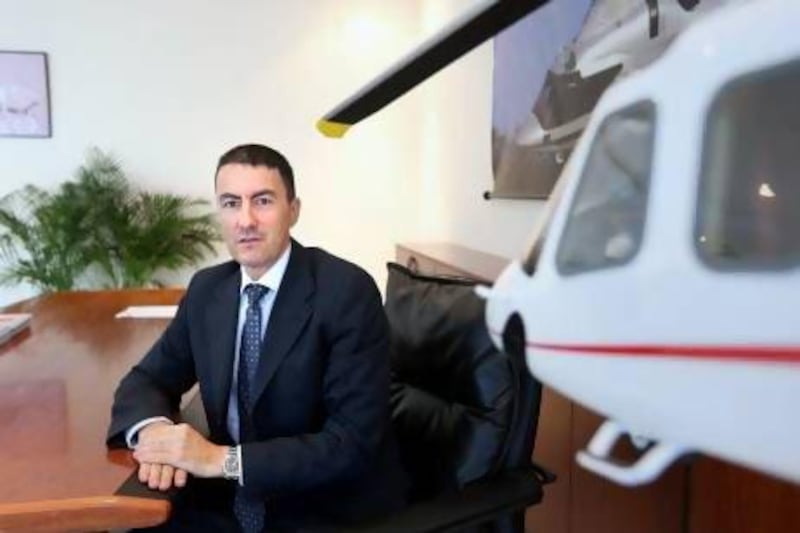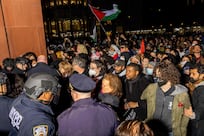Caio Mussolini, the great grandson of Italy's fascist dictator, always attracts attention when he introduces himself.
The Italian says he counters an array of questions and often needs to use his charm and sarcastic wit to win a good first impression.
"Sometimes I tell people I would have been 190cm tall, had I not had the burden of my last name as a weight on my shoulders - I am 180cm," he says. "In Italy, when I call up a restaurant to book a table and they ask for my name, sometimes they hang up. Other times they will call me back and say: 'Lei è parente?' [which means: are you a relative?] If I want to joke, I'll say: 'relative to whom? I have my dad, my uncle, my grandfather …'"
Mr Mussolini heads the Middle East business for Italy's biggest defence contractor, Finmeccanica, which builds everything from helicopters to training jets and trains to satellites.
At his office in Abu Dhabi, among the framed black-and-white pictures on the walls is a photograph of Vittorio, Caio's grandfather, the son of Benito Mussolini who ruled Italy for more than 20 years. Behind him is a photograph of a Cant Z 1007 bomber that Vittorio flew during his service in the Italian air force. The photograph is dated 1942.
Right next to the photograph is a model of the same aircraft in the photograph, which he found at a toy shop by chance in Italy. Caio was born in 1968 in Buenos Aires, Argentina. But his place of birth is really due to the events that unfolded after his great grandfather Benito Mussolini was toppled from power in 1943.
Vittorio, Benito's first son, was among the handful of fascists who escaped Italy for South America at the end of the Second World War.
In the months leading up to his departure, Italy had become divided, with the centre to the south under Allied control, while Rome to the north was under German control.
Vittorio had taken refuge in a church and disguised himself as a monk in a bid to escape the wrath of partisans, says Mr Mussolini.
"My grandma with my dad, who was about eight years old, and his sisters went to visit him. When my father saw Vittorio, he started to shout: 'Papà! papà ..!' My grandmother slapped him and said: 'No, its not papà, its padre [father]'. You can imagine, they could have killed him if they heard that."
Vittorio left soon after. He made Argentina his new home and opened a succession of Italian restaurants to maintain a living.
At the age of two, Caio moved with his parents back to Italy. He became immediately exposed to the public eye and criticism over his great grandfather.
"Of course, now I am 45 years old, things are different," Mr Mussolini says. "But when you are a child, it's very heavy. There is the familial version and then there are the official stories. I tried to mix to find a balance somewhere in between."
Although he shied away from his heritage, he has not been immune to the constant flow of reports, essays, articles and books on his great grandfather.
"Sometimes it's difficult to see things in an objective way. This is in my opinion one characteristic of the Italians: they go from one excess to another," he says.
"You cannot judge more than 20 years of government and say it was bad or it was good. It's very, very complicated, but at the end of the day, we are Italian."
At the age of 10, Mr Mussolini's family moved to Venezuela, which during the 1970s was very much the crown jewel of South America. The country flourished on booming oil prices, which buoyed a vibrant middle class and paved the way for distribution of wealth to even the most impoverished.
"I was happy to move. I was relaxed, no one was annoying me," he says. "I am very much linked to Venezuela. It's a country I love. It's where I studied. I still have a lot of friends there and I speak Spanish better than Italian. It was a great place to grow up in, but now things have changed a little bit."
By 1986, he had graduated from secondary school and was admitted into the Italian naval academy. "It was very tough, always studying under pressure and in a demanding environment. There were engineering and military courses. The level of preparation was very high."
He finished his programme in 1990 and had the option of being a pilot, a special corps officer, a marines officer, a navy seal. He chose to become a submarine officer.
"I joined for two reasons. Firstly, the crew on a submarine is very small so immediately you have big responsibilities. Secondly, I liked the environment, it was like a family, you had to be very pragmatic."
He spent eight years as a submarine officer, which he describes as a job only for the thick-skinned.
"You share your bed with others, the 'hot-bed' system. Every tiny space of the submarine is used for something, a manual, luggage, food, spare parts - there is no personal space. You don't have plenty of water to have a shower and, when you do, you might not be able to because you can't make noise during a military exercise. Water makes noise. Even the food onboard, after two to three weeks, you run out of fresh vegetables."
Mr Mussolini describes one moment where the cook on the submarine attempted to devise other forms of food.
"For us Italians, food is very important. It's part of our culture," he says. "They tried to make 'astronaut food', you know, the type where you just have to add water. The crew protested. They said 'No way! We are Italian - we have to have our pasta and our pizza.'"
During his time in the navy he participated in several international missions including Nato's military operation against the Federal Republic of Yugoslavia and supporting the Italian army and marines in Albania and Kosovo.
In 1998, he was appointed as the commanding officer of Italian warship MTC Gorgona A5347. He maintained his post for one year before making the bold decision to venture to the private sector with ambitions to forge a broader career and to live abroad.
"A lot of the internal mechanism in the navy means that my future career was going to be linked to the naval academy results. In the navy, if you're lucky, you can act as a military attache at an embassy abroad or be appointed a role in Nato in Brussels. But at the end, you have to return to Italy. One of the advantages of working abroad is that the more time you stay there, the more you get experience. The links, contacts, become incredible value for the company," he says. Mr Mussolini joined Oto Melara, one of Finmeccanica's affiliates in 2002. He was responsible for sales and marketing of their products in Latin America and the Middle East.
In 2007, Finmeccanica set up an office in Abu Dhabi, where he became the head of the local office, as the defence contractor expanded its reach in the region.
Over that period, Finmeccanica embarked on a number of joint ventures and business activities, prompting the company to have a local presence in a thriving market. Last year, he became Finmeccanica's vice president for marketing and business development and head of the Middle East office.
Living in the Middle East, he was able to see the 2011 Arab Spring from an Arabian Gulf standpoint and says his home country's role has been largely overlooked. "Italy participated in the Libyan operations, we sent warships, aircraft, support food, people to translate operations.
The majority of the naval and air activities were managed from Nato centres in Italy. However, our role is not so recognised," he says.
Still, he adds that doing business in the Gulf can be challenging.
"You need to be very patient. The expectations are very high and the way you work to get these expectations is very important. At the same time, you need to be the link between your headquarters and the local company, bringing together two different cultures."
Mr Mussolini has contributed to the success of the UAE Air Force aerobatic team Al Fursan with his company providing seven Aermacchi 339 modified combat jets and training provided by the Italian air force. The UAE pilots moved to Rivolto in Italy for a year in 2010, the base of Frecce Tricolori, the Italian aerobatic team.
In just a few years, the Al Fursan Team became very popular with their sophisticated aerobatic performances, like the impressive shows put on during the UAE's National Day celebrations. They also perform in Europe and other Middle Eastern states.
Caio has invested a lot of time in his two children, educating them about their heritage and family history. "We have a quite peculiar surname. There is just a few of us in Italy. What I am trying to teach my kids, is that these events happened four generations ago and they are not responsible for anything [to do with that time], whether good or bad."
His son Carlo, 17, is studying the Second World War at school in Abu Dhabi. "A lot of the students are curious about his surname. For them, it's like having a piece of history in the classroom."





